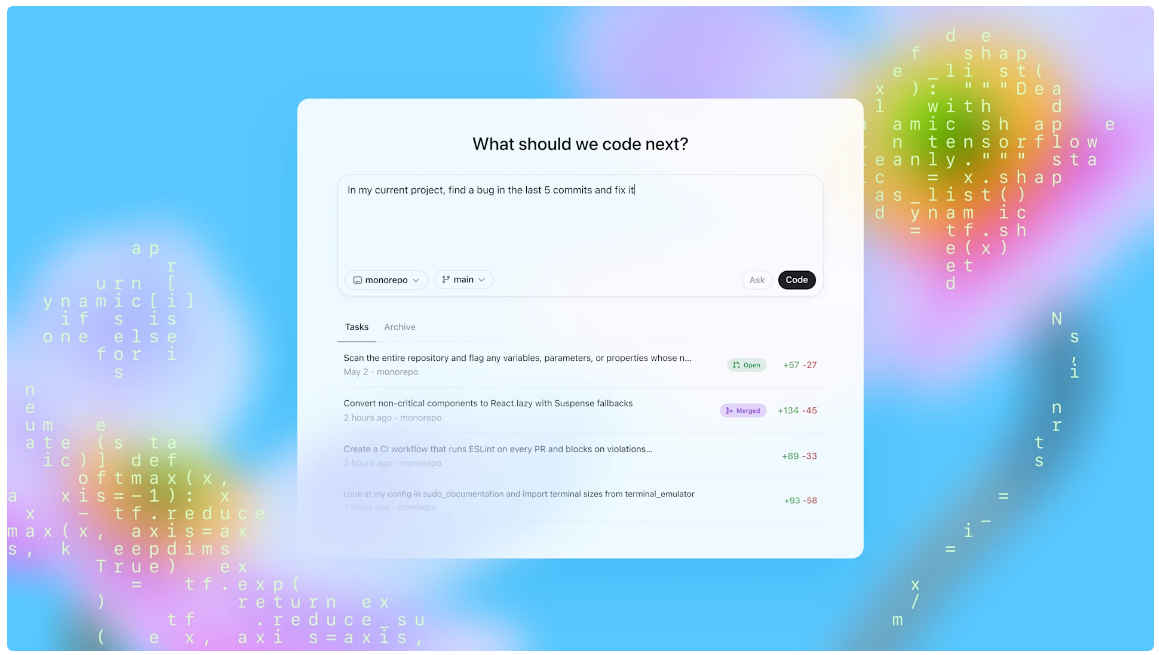Table of Contents
Overview
In the fast-paced world of software development, every edge counts. Imagine having an AI assistant that understands your code, suggests improvements, and even helps you write new features. That’s the promise of Codex by OpenAI, a powerful AI model designed to revolutionize the way developers work. Let’s dive into what makes Codex a game-changer and whether it lives up to the hype.
Key Features
Codex boasts a range of features designed to streamline the development process:
- Code generation and explanation: Codex can generate code snippets based on natural language prompts and provide clear explanations of existing code, making it easier to understand complex logic.
- Bug fixing and refactoring: Identify and fix bugs more efficiently with Codex’s intelligent suggestions, and refactor code for improved readability and performance.
- Secure sandboxed environments: Work with your code in a secure, isolated environment, minimizing the risk of unintended consequences.
- Integration with code repositories: Seamlessly integrate Codex with your existing code repositories, allowing it to learn from and contribute to your projects.
- Pull request suggestions: Codex can analyze code changes and suggest improvements for pull requests, ensuring code quality and consistency.
How It Works
Codex operates by analyzing the context of your code within secure, sandboxed environments. It understands developer prompts written in natural language and leverages large-scale language models trained on vast amounts of public code. This allows it to generate intelligent code suggestions, identify potential bugs, and provide helpful explanations. Think of it as having a highly experienced pair programmer constantly available to assist you.
Use Cases
Codex’s capabilities open up a wide range of potential applications:
- Assisting in software development: Accelerate the development process by automating repetitive tasks and providing intelligent code suggestions.
- Automating code documentation: Generate code documentation automatically, saving time and ensuring that your codebase is well-documented.
- Debugging and code review support: Identify and fix bugs more efficiently with Codex’s intelligent debugging tools and get assistance with code reviews.
- Learning and teaching programming concepts: Use Codex as a learning tool to explore new programming concepts and improve your coding skills.
Pros & Cons
Like any tool, Codex has its strengths and weaknesses. Let’s break down the advantages and disadvantages.
Advantages
- Reduces coding time significantly by automating repetitive tasks.
- Enhances developer productivity by providing context-aware assistance.
- Supports multiple programming languages, making it versatile for various projects.
- Offers context-aware assistance, understanding the nuances of your codebase.
Disadvantages
- Dependent on code context quality; inaccurate or incomplete code can lead to suboptimal suggestions.
- May produce incorrect or insecure suggestions, requiring careful review.
- Not a replacement for thorough code review by human developers.
How Does It Compare?
While Codex is a powerful tool, it’s not the only AI-powered coding assistant on the market. Two notable competitors are:
- GitHub Copilot: Offers focused integration with Visual Studio Code, providing seamless code completion and suggestions within the popular IDE.
- Amazon CodeWhisperer: Provides tighter integration with the AWS ecosystem, making it a good choice for developers working primarily with AWS services.
Each tool has its strengths, so the best choice depends on your specific needs and development environment.
Final Thoughts
Codex by OpenAI represents a significant step forward in AI-assisted software development. While it’s not a magic bullet that will replace human developers, it can be a valuable tool for boosting productivity, improving code quality, and streamlining the development process. By understanding its strengths and limitations, developers can leverage Codex to unlock new levels of efficiency and innovation.
https://openai.com/index/introducing-codex/